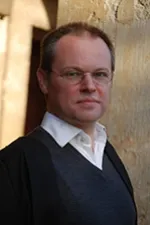Gero Miesenböck
Image

Dr. Miesenböck is a pioneer in the field of optogenetics, which features the ability to use light to “turn on” and “turn off” brain cells. When compared to other classes of techniques, optogenetics offers improved precision and accuracy in manipulating specific cells and their actions. Therefore, optogenetics will become an indispensable tool in developing future treatments for neurological diseases.
Enjoy Dr. Miesenböck's 2010 TED talk below:
